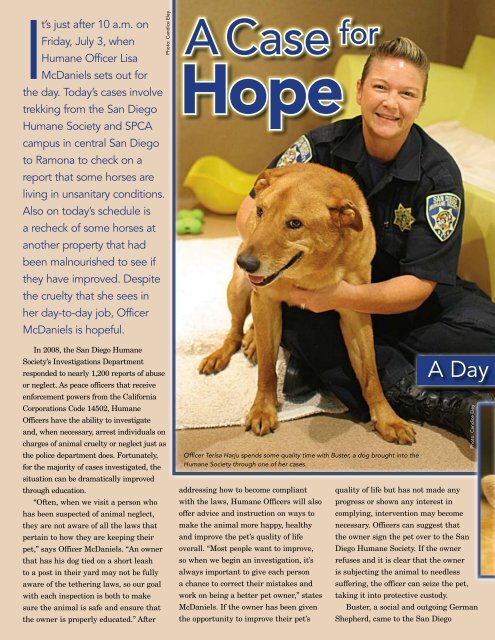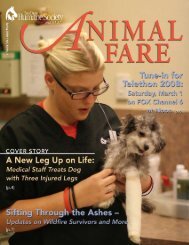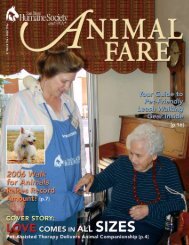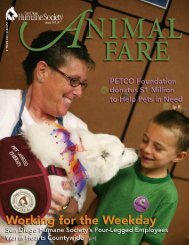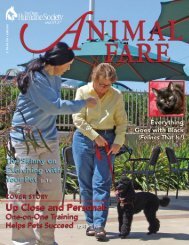Fall 2009 ⢠V ol. 43 No. 3 - San Diego Humane Society and SPCA
Fall 2009 ⢠V ol. 43 No. 3 - San Diego Humane Society and SPCA
Fall 2009 ⢠V ol. 43 No. 3 - San Diego Humane Society and SPCA
Create successful ePaper yourself
Turn your PDF publications into a flip-book with our unique Google optimized e-Paper software.
It’s just after 10 a.m. on<br />
Friday, July 3, when<br />
<strong>Humane</strong> Officer Lisa<br />
McDaniels sets out for<br />
the day. Today’s cases inv<strong>ol</strong>ve<br />
trekking from the <strong>San</strong> <strong>Diego</strong><br />
<strong>Humane</strong> <strong>Society</strong> <strong>and</strong> <strong>SPCA</strong><br />
campus in central <strong>San</strong> <strong>Diego</strong><br />
to Ramona to check on a<br />
report that some horses are<br />
living in unsanitary conditions.<br />
Also on today’s schedule is<br />
a recheck of some horses at<br />
another property that had<br />
been malnourished to see if<br />
they have improved. Despite<br />
the cruelty that she sees in<br />
her day-to-day job, Officer<br />
McDaniels is hopeful.<br />
In 2008, the <strong>San</strong> <strong>Diego</strong> <strong>Humane</strong><br />
<strong>Society</strong>’s Investigations Department<br />
responded to nearly 1,200 reports of abuse<br />
or neglect. As peace officers that receive<br />
enforcement powers from the California<br />
Corporations Code 14502, <strong>Humane</strong><br />
Officers have the ability to investigate<br />
<strong>and</strong>, when necessary, arrest individuals on<br />
charges of animal cruelty or neglect just as<br />
the p<strong>ol</strong>ice department does. Fortunately,<br />
for the majority of cases investigated, the<br />
situation can be dramatically improved<br />
through education.<br />
“Often, when we visit a person who<br />
has been suspected of animal neglect,<br />
they are not aware of all the laws that<br />
pertain to how they are keeping their<br />
pet,” says Officer McDaniels. “An owner<br />
that has his dog tied on a short leash<br />
to a post in their yard may not be fully<br />
aware of the tethering laws, so our goal<br />
with each inspection is both to make<br />
sure the animal is safe <strong>and</strong> ensure that<br />
the owner is properly educated.” After<br />
Photo: C<strong>and</strong>ice Eley<br />
A Case for<br />
Hope<br />
Officer Terisa Harju spends some quality time with Buster, a dog brought into the<br />
<strong>Humane</strong> <strong>Society</strong> through one of her cases.<br />
addressing how to become compliant<br />
with the laws, <strong>Humane</strong> Officers will also<br />
offer advice <strong>and</strong> instruction on ways to<br />
make the animal more happy, healthy<br />
<strong>and</strong> improve the pet’s quality of life<br />
overall. “Most people want to improve,<br />
so when we begin an investigation, it’s<br />
always important to give each person<br />
a chance to correct their mistakes <strong>and</strong><br />
work on being a better pet owner,” states<br />
McDaniels. If the owner has been given<br />
the opportunity to improve their pet’s<br />
A Day<br />
quality of life but has not made any<br />
progress or shown any interest in<br />
complying, intervention may become<br />
necessary. Officers can suggest that<br />
the owner sign the pet over to the <strong>San</strong><br />
<strong>Diego</strong> <strong>Humane</strong> <strong>Society</strong>. If the owner<br />
refuses <strong>and</strong> it is clear that the owner<br />
is subjecting the animal to needless<br />
suffering, the officer can seize the pet,<br />
taking it into protective custody.<br />
Buster, a social <strong>and</strong> outgoing German<br />
Shepherd, came to the <strong>San</strong> <strong>Diego</strong><br />
Photo: C<strong>and</strong>ice Eley


